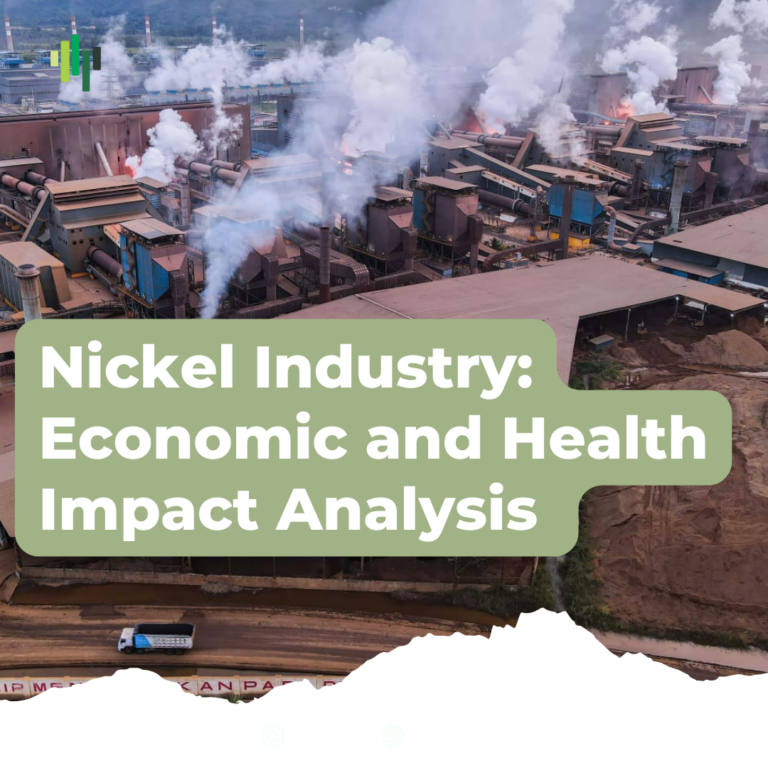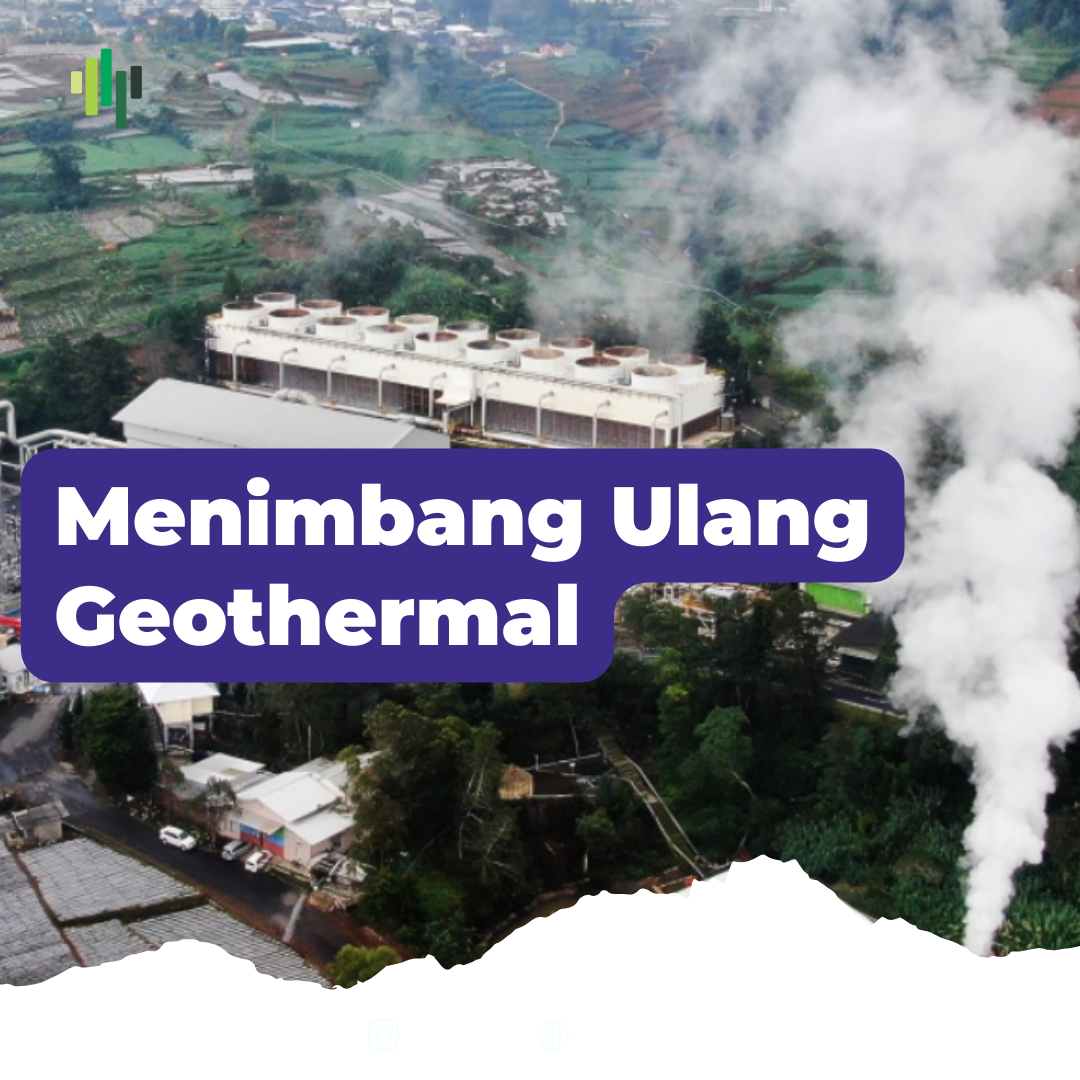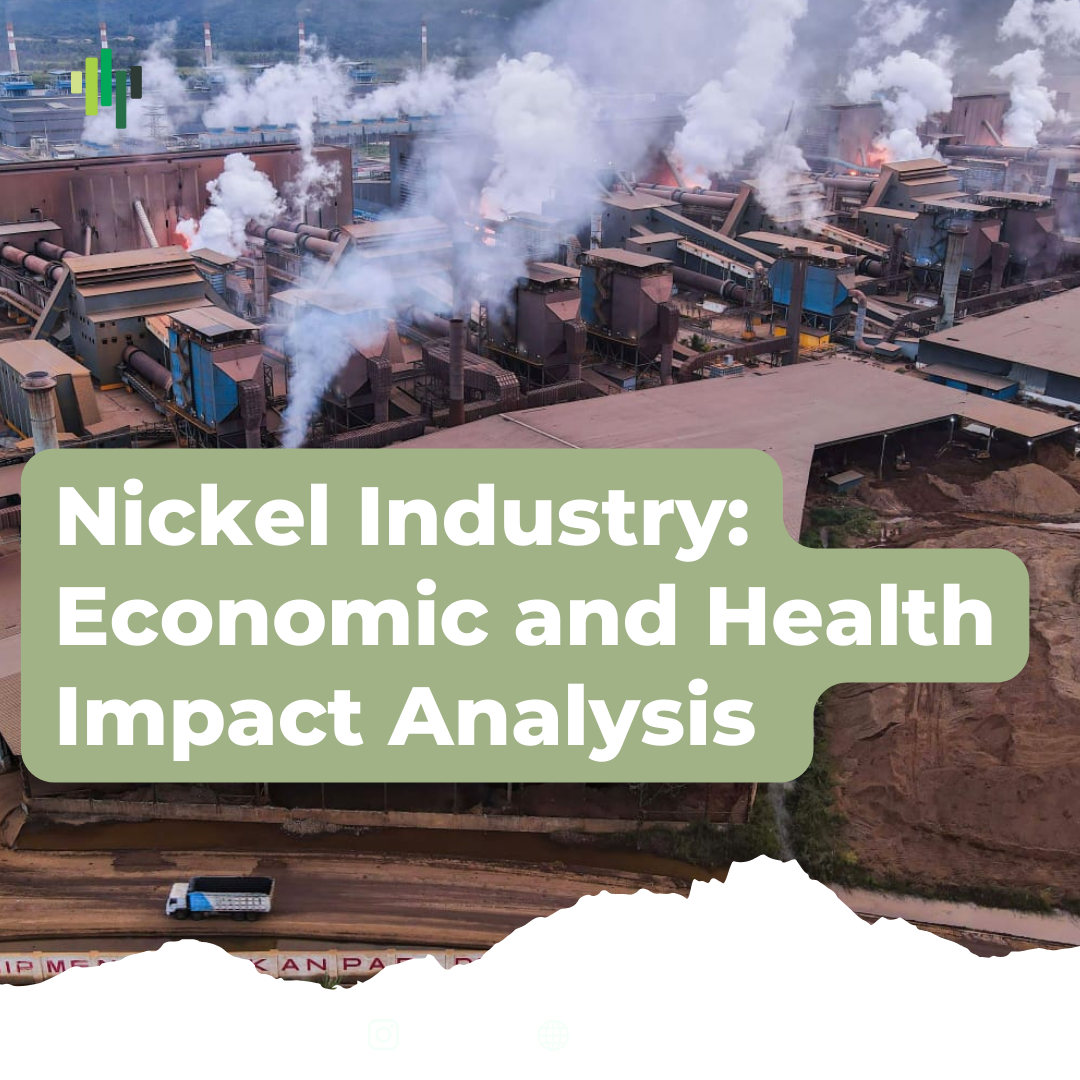New study shows the economic and health cost of Indonesia’s drive for nickel processing
Economic gains for the country diminish in eight years and are undermined by costs on public health, livelihoods, and ecology.
Download Report (English version):
[EN] CREA_CELIOS – Indonesia Nickel Development 2024
Laporan Bahasa Indonesia:
[ID] CREA_CELIOS – Indonesia Nickel Development 2024
Press release
Jakarta, 20 February 2024 — The global demand for nickel has burgeoned with the rise of electric cars. In an attempt to increase the nation’s revenue by exporting only processed nickel, Indonesia’s President Joko Widodo banned the export of nickel ores in 2020. Today, the downstreaming of nickel has become an important issue for Indonesia amid political years. The ban on nickel ore exports and increased domestic processing have raised nickel export values from USD 4 billion in 2017 to USD 34 billion in 2022, or an increase of 750%. However, claims of positive impacts from nickel downstreaming often overlook the effects on environmental risks and public health.
A new study on the health and economic impacts of the nickel processing drive from the Centre for Research on Energy and Clean Air (CREA) and the Center of Economic and Law Studies (CELIOS) has debunked the supposed economic gains. The study, titled ‘Debunking the Value-Added Myth in Nickel Downstream Industry’, is a deep dive into the economic, ecological, and public health impacts of the industry, with a focus on the top three locations for nickel smelting operations: the provinces of Central Sulawesi, Southeast Sulawesi and North Maluku.
The nickel industry’s current growth pathway in the focus regions would contribute USD 4 billion (IDR 62.8 trillion) in the fifth year of construction. From then on, the industry’s negative impacts on the local ecology begin to affect the total economic output, becoming more drastic after the eighth year.
“Despite the promised future and opportunities that would be seized through the country’s massive nickel industry, its impacts on the country’s population, especially its health and source of livelihoods, put them at great risk,” said the Executive Director of Celios, Bhima Yudhistira Adhinegara, summarising the results of the report.
Environmental degradation is one of the impacts arising from nickel processing operations. The decline in water, soil, and air quality leads to a decrease in the livelihoods of fishermen and farmers in the vicinity of industrial areas. Projected in the report is that over the next 15 years, farmers and fishermen will incur losses of up to IDR 3.64 trillion (USD 234.84 million).
Additionally, the myth regarding how nickel industry projects can enhance the welfare of local residents through employment absorption and wage increases is also refuted in this study. The increase in employment absorption will only occur in the third year during the factory construction phase, then tend to decline until the fifteenth year, as the negative impacts of the presence of the nickel industry affect job absorption in other sectors, particularly agriculture and fisheries.
This is attributed to the presence of operational Captive Coal Power Plants, which are inherent to industrial areas, particularly those involved in the nickel smelter industry. Processing low-grade nickel ores is energy-intensive, and Indonesia relies on coal power. Of the 10.8 GW operating capacity of all captive coal power in Indonesia, over 75% (8.2 GW) is dedicated to metal processing. Of this, nickel alone consumes three-fourths or about 6.1 GW.
“The industry’s reliance on coal power would lead to at least 3,800 annual deaths in the next two years, and nearly 5,000 by the end of the decade, causing an economic burden of USD 2.63 billion and USD 3.42 billion per year in the same period,” said Katherine Hasan, Analyst at CREA.
China is currently the largest investor in captive coal power in Indonesia, with more than 70% ownership held by 14 private and state-owned metals processing and mining companies.
“China’s continued investment in coal power has played a significant role in undermining Indonesia’s emission reduction targets,” said Lauri Myllyvirta, Lead Analyst at CREA. “Despite China’s 2021 pledge to stop building coal power plants overseas, investments in coal power in Indonesia have continued, and all of the captive coal power plants with Chinese investment are based in Indonesia’s power metals and mining industrial parks,” he added.
The researchers recommend policies to power nickel smelters with clean energy instead of coal power, strengthened emissions and environmental standards and disclosure, as well as increased royalty payments. These measures would reduce the negative public health and environmental impacts and increase the national economic benefits from Indonesia’s rich nickel deposits.
Bahasa version
Siaran Pers
Studi baru menunjukkan dampak ekonomi dan kesehatan dari pengolahan nikel di Indonesia
Keuntungan ekonomi bagi negara ini berkurang dalam delapan tahun dan dirusak oleh dampak buruk terhadap kesehatan masyarakat, mata pencaharian, dan ekologi.
Jakarta, 20 Februari 2024 — Permintaan nikel global meningkat seiring dengan maraknya mobil listrik. Dalam rangka meningkatkan pendapatan negara dengan hanya mengekspor nikel olahan, Presiden Joko Widodo melarang ekspor bijih nikel pada tahun 2020. Saat ini, hilirisasi nikel menjadi isu penting bagi Indonesia di tengah tahun politik. Pelarangan ekspor bijih nikel dan peningkatan pengolahan domestik telah meningkatkan nilai ekspor nikel dari USD 4 miliar pada tahun 2017 menjadi USD 34 miliar pada tahun 2022, atau meningkat sebesar 750%. Namun, klaim dampak positif dari hilirisasi nikel seringkali mengabaikan efek terhadap risiko lingkungan hidup maupun kesehatan masyarakat.
Sebuah studi baru mengenai dampak kesehatan dan ekonomi dari upaya pengolahan nikel yang dilakukan oleh Centre for Research on Energy and Clean Air (CREA) and Center of Economic and Law Studies (CELIOS) menilik ulang keuntungan ekonomi yang diharapkan. Studi yang bertajuk ‘Membantah Mitos Nilai Tambah, Menilik Ulang Industri Nikel’ ini merupakan kajian mendalam mengenai dampak industri nikel terhadap ekonomi, ekologi, dan kesehatan masyarakat, dengan berfokus pada tiga provinsi utama operasi peleburan nikel, yakni: provinsi Sulawesi Tengah, Sulawesi Tenggara, dan Maluku Utara.
Laju pertumbuhan industri nikel yang saat ini berpusat di wilayah-wilayah tersebut diperkirakan akan menyumbang USD 4 miliar (Rp62,8 triliun) pada tahun kelima pembangunannya. Namun setelah itu, dampak negatif industri ini terhadap lingkungan dan produktivitas pertanian maupun perikanan akan mulai mempengaruhi total output perekonomian, dan menurun secara drastis setelah tahun kedelapan.
“Meskipun diklaim terdapat masa depan yang menjanjikan dan peluang yang sangat besar bagi negara yang bisa didapat industri nikel, dampaknya terhadap masyarakat sekitar, terutama kesehatan dan sumber mata pencaharian, menempatkan mereka pada risiko yang besar,” ungkap Direktur Eksekutif Celios, Bhima Yudhistira Adhinegara, merangkum hasil laporan.
Degradasi lingkungan merupakan salah satu dampak yang ditimbulkan oleh operasional pengolahan nikel. Menurunnya kualitas air, tanah dan udara, menyebabkan kemerosotan dalam jumlah nilai mata pencaharian pada nelayan dan petani di sekitar kawasan industri. Diproyeksikan dalam laporan, bahwa dalam 15 tahun ke depan, para petani dan nelayan akan mengalami kerugian hingga Rp3,64 triliun (USD 234,84 juta).
Selain itu, mitos tentang proyek industri nikel mampu meningkatkan kesejahteraan penduduk lokal melalui penyerapan tenaga kerja dan kenaikan upah turut terbantahkan dalam studi ini. Peningkatan dalam penyerapan tenaga kerja, hanya akan terjadi pada tahun ke-3 pada saat tahap konstruksi pabrik, kemudian cenderung menurun hingga tahun ke-15, seiring dampak negatif dari kehadiran industri nikel berpengaruh ke serapan kerja sektor usaha lainnya khususnya pertanian dan perikanan.
Hal ini tak terlepas dari keberadaan operasional Pembangkit Listrik Batu Bara Captive, yang keberadaannya melekat pada kawasan industri, khususnya pengolahan nikel. Pengolahan bijih nikel kadar rendah memerlukan banyak energi dan Indonesia bergantung pada tenaga batu bara. Dari 10,8 GW kapasitas operasi seluruh pembangkit listrik tenaga batubara di Indonesia, lebih dari 75% (8,2 GW) didedikasikan untuk pengolahan logam. Dari jumlah tersebut, nikel saja mengkonsumsi tiga perempatnya atau sekitar 6,1 GW.
“Ketergantungan industri pada pembangkit listrik tenaga batu bara akan menyebabkan setidaknya 3.800 kematian setiap tahunnya dalam dua tahun ke depan, dan hampir 5.000 kematian pada akhir dekade ini, sehingga menyebabkan beban ekonomi sebesar USD 2,63 miliar dan USD 3,42 miliar per tahun pada periode yang sama”, kata Katherine Hasan, Analis di CREA.
Tiongkok saat ini merupakan investor terbesar dalam pembangkit listrik tenaga batu bara di Indonesia, dengan lebih dari 70% kepemilikan dimiliki oleh 14 perusahaan pengolahan dan pertambangan logam swasta dan milik negara.
“Investasi berkelanjutan Tiongkok pada pembangkit listrik tenaga batubara telah memainkan peran penting dalam melemahkan target pengurangan emisi Indonesia,” kata Lauri Myllyvirta, Analis Utama di CREA. “Meskipun Tiongkok berjanji pada tahun 2021 untuk berhenti membangun pembangkit listrik tenaga batubara di luar negeri, investasi pada pembangkit listrik tenaga batubara di Indonesia terus berlanjut, dan semua pembangkit listrik tenaga batubara yang didanai oleh investasi Tiongkok berbasis di kawasan industri pembangkit listrik tenaga batubara dan pertambangan di Indonesia,” tambahnya.
Contacts
| Katherine Hasan
Analyst, CREA +62 877-8718-6363 |
Atina Rizqiana
Researcher, CELIOS +62 857-1158-9157 |
About the research
The study quantified the economic and health impacts of the nickel downstream industry in three nickel-rich provinces, namely Central Sulawesi, Southeast Sulawesi, and North Maluku, through the use of an economic model and air pollution dispersion model. In the economic model, CELIOS utilised the Inter-Regional Input-Output (IRIO) approach to measure inter- and intra-regional effects of nickel investments, through analysis of final impacts on household consumption, government consumption, investment, changes in stocks, and exports. For the health impacts assessment (HIA), CREA conducted the analysis by (1) developing an inventory of emissions from nickel processing centres, which include emissions from the process and the captive power generation; (2) simulating pollution dispersion using detailed atmospheric modelling; (3) quantifying health impacts caused by changes in air pollutant concentrations; and (4) valuing health impacts in monetary terms using economic costs per outcomes (rated to Indonesia’s income and GDP per capita).
About CREA
The Centre for Research on Energy and Clean Air (CREA) is an independent research organisation focused on revealing the trends, causes, and health impacts, as well as the solutions, to air pollution. CREA was founded in December 2019 in Helsinki and has staff in several Asian and European countries. The organisation’s work is funded through philanthropic grants and revenue from commissioned research. www.energyandcleanair.org
About CELIOS
The Center of Economic and Law Studies (CELIOS) is a research institution that focuses on macro-economic analysis, public policy, and sustainable economics. CELIOS uses economic modelling to influence public policy and help government, companies and local communities better understand the impact of policy in energy and transition minerals. CELIOS also closely works with international media and various CSO to put attention on Indonesia’s economic and energy agenda. https://celios.co.id



